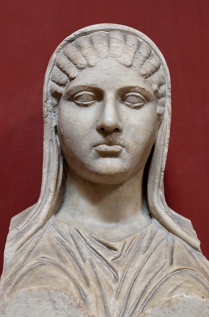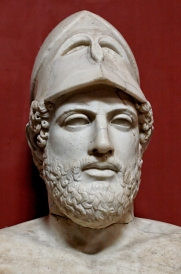Aspasia

Aspasia was born between the years 470 and 465 B.C. in Miletus. She was the daughter of Axioschus. It is suggested that she came to Athens around 450 B.C as a fatherless refugee who was of marriageable age. It is believed that she was related by her sister’s marriage to the grandson of the notorious Alcibiades. Alcibiades was ostracized from Athens in 460 B.C. , and it is believed that he spent his exile in Miletus.[1] Aspasia, once is Athens, became the companion of Pericles, a political leader in classical Athens.
Aspasia was a beautiful woman and renowned for her intelligence and knowledge. Aspasia appears in Socratic writings of the fourth century B.C as a woman of worldly wisdom and beauty, a perfect gold for Socrates.”[2]
Aspasia and Pericles
Aspasia was the supposed mistress of and eventually companion to Pericles after his divorced. Pericles, a prominent political figure, was unable to marry Aspasia because of the law prohibiting marriage of a noble Athenians to a foreigner. The law, dating to 340 B.C., is stated by Theomnestos’ synegoros, Apollodoros.
“If a foreign man lives in marriage with a citizen women in any manner or means whatsoever, let any Athenian who possesses, this right indict him before the thesmothetes. If he is convicted, both he and his property are to be sold, and one-third of is to go to the successful prosecutor. The same is to apply is a foreign women lives in marriage with a citizen man; in addition, the [citizen] man living in marriage with a foreign women thus convicted is to be fined 1000 drachmas.”[3]
Although they were never able to be husband and wife, Pericles and Aspasia were very much in love, a rare occurrence in classical Athens. Plutarch tells us:
“Legally bestowed her upon another man, with her own consent, and himself took Aspasia, and love exceedingly. Twice a day, as they say, on- going out and on coming in from the market-place, he would salute her with a loving kiss. (Plutarch, 24.5-6) Plutarch evidently observed that the couple were affectionate to each other despite not being married. It shows us that Aspasia and Pericles were in love. It is arguable one of the few recorded romantic love between a man and a woman in classical Athens.”
It appears that Pericles’ affection towards Aspasia was immensely erotic, which eventually resulted in a child out of wedlock, who according to Pericles’ citizenship law, which defined that “if women were not Athenians, their children were not Athenian citizens”[4], could not be a citizen of Athens. This subsequently ended by Pericles defying his own law and declaring his child a legitimate citizen of Athens.
Aspasia and Politics
Aspasia is perhaps the most

influential female when it came to politics in classical Athens. Aspasia was friends with some of the most intellectually and politically powerful men of the fifth-century Athens, including: Socrates, Xenophon, Alcibiades, Anaxagoras, Phidias and her companion Pericles. [5]
Pericles was arguably the most politically influenced by Aspasia. Plutarch told us that gossip had it that Pericles decision to fight the war against Samos was greatly influence by Aspasia.[6] Plutarch claimed that Pericles admired Aspasia’s political wisdom by reporting that Aspasia “was held in high favor by Pericles because of her rare political wisdom.”[7] Zeno disclosed that Pericles consulted Aspasia on all political matters. [8]
Aspasia’s political influence was a direct result of her intelligence and knowledge, which was appreciated by men of higher political positions. Sarah B. Pomeroy tells us in her book Goddesses, Whores, Wives and Slaves: Women in Classical Antiquity,
“Sources claim that Aspasia was highly valued by Pericles because she was clever and politically astute. After all, Socrates sometimes visited her, bringing along his pupils and his close friends who took their wives to listen to her – although she ran an establishment that was neither orderly nor respectable, seeing that she educated a group of young female companions to become courtesans. Aeschines says that Lysicles the sheep dealer, a man lowly born and humble of nature, became the most important man of Athens by living with Aspasia after the death of Pericles. Consequently there is a good deal of truth contained in the Menexenus of Plato (even if the first part is written tongue in cheek) when it states that she had a reputation of associating with many Athenians as a teacher of rhetoric.”
Aspasia the Hetaera
Aspasia is often referred to in modern day as a famous hetaera in classical Athens. For example, when discussing hetaerai in Women in the Classical World, the authors tells us “Of these women, only one played a significant role in Athenian history: the famous hetaera and later madam, Aspasia.” [9] Aspasia is believed to have been a hetaera thanks to comedians of the fifth century, for example comic Cratinus or comic Eupolis, who often referred to Aspasia as both a concubine and a whore. This association was later repeated by Plutarch, who in the fifth century reported that she modeled herself on Thargelia, the Ionian courtesan who attempted to capture the affections of the most powerful men of the day and to influence them politically.[10]
There is no conclusive contemporary evidence that Aspasia was in fact a hetaera.[11] We know little about Aspasia and her life which can lead to creating false identities of someone, especially a female, in history.
Sources on Aspasia
Although Aspasia has been mentioned in comedy, philosophy, history, and art, there is no sources from Aspasia herself. Despite the fact that she was greatly knowledgeable and taught and influenced some of the most important figures in classical Greece, there was never any writings or art found from Aspasia herself. It could be argued that there is no writing from Aspasia because she was a woman and would not have produced any, but evidence proves that Aspasia went against the gender norms in classical Athens. Whatever writing she may produced, however, has fallen victim to the vicissitudes of time. Yet details about Aspasia’s life can be found in different sources. Most of these sources are from writings most popularly from Plutarch, Socrates, Plato, Aristophanes and Xenophon. It is important to note that Aspasia is only ever mentioned in these writings, and only ever has Pericles’ companion.
Although most sources regarding Aspasia are written, in 1777 a Roman copy of a funerary stele, which is believed to be from the 5th century B.C., had “Aspasia” inscribed on the bottom. [12] This gives us an idea of her appearance and beauty. Please view imagine 1.1.
[1] Henry, Madeleine M. (1995). Prisoner of History: Aspasia of Miletus and Her Biographical Tradition. New York: Oxford University Press, 10.
[2] Vermeule, Cornelius C. (1928). “Socrates and Aspasia: New Portraits of Late Antiquity.” The Classical Journal, 54(2) : 52.
[3] Bakewell, G. (2008). Forbidding Marriage: “Neaira” 16 and Metic Spouses at Athens. The Classical Journal, 104(2), 97.
[4] Wyder, Kathleen. (1986). “Women Philosophers in the Ancient Greek World: Donning the Mantle.” Hypatia, 1(1) : 41.
[5] Fantham, Elaine, Helene Peet Foley, Natalie Boymel Kampen, Sarah B. Pomeroy, and H. A. Shapiro. (1994). Women in the Classical World. New York: Oxford University Press, 71.
[6] Fantham, Elaine, Helene Peet Foley, Natalie Boymel Kampen, Sarah B. Pomeroy, and H. A. Shapiro. (1994). Women in the Classical World. New York: Oxford University Press, 71.
[7] Wyder, Kathleen. (1986). “Women Philosophers in the Ancient Greek World: Donning the Mantle.” Hypatia, 1(1) : 40.
[8] Pomeroy, Sarah B. (1995). Goddesses Whores, Wives and Slaves: Women in Classical Antiquity. 2nd ed. 89.
[9] Fantham, Elaine, Helene Peet Foley, Natalie Boymel Kampen, Sarah B. Pomeroy, and H. A. Shapiro. (1994). Women in the Classical World. New York: Oxford University Press, 114.
[10] Henry, Madeleine M. (1995). Prisoner of History: Aspasia of Miletus and Her Biographical Tradition. New York: Oxford University Press, 10.
[11] Henry, Madeleine M. (1995). Prisoner of History: Aspasia of Miletus and Her Biographical Tradition. New York: Oxford University Press, 10.
[12] Aspasia of M1letus. (n.d.). Retrieved from http://penelope.uchicago.edu/~grout/encyclopaedia_romana/greece/hetairai/aspasia.html